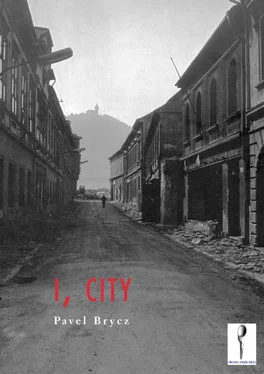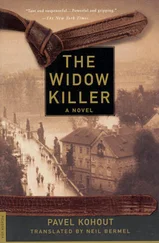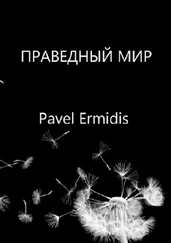Pavel Brycz - I, City
Здесь есть возможность читать онлайн «Pavel Brycz - I, City» весь текст электронной книги совершенно бесплатно (целиком полную версию без сокращений). В некоторых случаях можно слушать аудио, скачать через торрент в формате fb2 и присутствует краткое содержание. Год выпуска: 2006, Издательство: Twisted Spoon Press, Жанр: Современная проза, на английском языке. Описание произведения, (предисловие) а так же отзывы посетителей доступны на портале библиотеки ЛибКат.
- Название:I, City
- Автор:
- Издательство:Twisted Spoon Press
- Жанр:
- Год:2006
- ISBN:нет данных
- Рейтинг книги:5 / 5. Голосов: 1
-
Избранное:Добавить в избранное
- Отзывы:
-
Ваша оценка:
- 100
- 1
- 2
- 3
- 4
- 5
I, City: краткое содержание, описание и аннотация
Предлагаем к чтению аннотацию, описание, краткое содержание или предисловие (зависит от того, что написал сам автор книги «I, City»). Если вы не нашли необходимую информацию о книге — напишите в комментариях, мы постараемся отыскать её.
Dubliners
I, City
I, City — читать онлайн бесплатно полную книгу (весь текст) целиком
Ниже представлен текст книги, разбитый по страницам. Система сохранения места последней прочитанной страницы, позволяет с удобством читать онлайн бесплатно книгу «I, City», без необходимости каждый раз заново искать на чём Вы остановились. Поставьте закладку, и сможете в любой момент перейти на страницу, на которой закончили чтение.
Интервал:
Закладка:
“Now it’ll never dry!” Mr. Novák proclaims, gazing at the tanks tearing the asphalt of the main street with their treads, their noise tearing the eardrums of those great pals of Mozart, those pitch-perfect Czechs, the pennyweight heroes for whom Blaník had been exchanged for Bílá hora.
And for ages men disappeared into pubs and boys didn’t grow up to be men, though their dreams were of such kind as if they had long ago formed The Brotherhood of Cremation.
AN APPEARANCE, SPORTING
The hall opposite the boarding school with a stadium at its side has to have some strange genius loci. Consider the enormous amount of human sweat that has evaporated here over these many years. That surely gives off a substantial whiff of something. The hall simply savors of humanness.
I, city, can smell the humanness, too, and I know what it costs a boxer for a TKO, a table-tennis player a winning ball, a basketball player a basket, a handball player a point, and… and…
Simply, a sea of sweat.
And beyond this, for many boys and girls this hall represented not only a ticket to the world of sport, but also an invitation to the palace of art. Concerts of pop singers and bands were held here, and it was possible to go through the dressing room and directly into the concert without paying admission.
Who wouldn’t be enchanted by this strange world from the other side? When coming through the artists’ entrance and you sense the crowd as a rhythmic quiver, the entire expanse of the sporting hall is for you at that moment rhythm materialized, thrusting into you like a small tattooing needle. You mustn’t move fitfully, you mustn’t violate the rhythm; you have to be in synch with it to keep the pained tears from your cheeks.
And if you succeed? It’s like an orgasm touching eternity. Though it lasts only a short while, it can reproduce you to the infinitude of being.
Then the sweat and the rhythm reverberate in the atmosphere for a long time after. And if I gaze into the sporting hall, I become all bathed in sweat.
And if I hit up against the needle wrongly — also in blood.
AN APPEARANCE, MAY
If there is a month of May, the high-school graduates have its number. They can’t play catch up on the lost months.
Not that they don’t know anything, they do. Nor that they wouldn’t be in love in the very month of love. That they are, too. Headfirst in love, up to the ankles.
What they lack above all is a class photograph, which would be placed in a shop window to present them to the crowd on the streets. “Look, that’s us — who better?” it should proclaim to the world. And it should be bold, original, and bright.
But there’s none.
The boys suggested photographing their bared behinds, but the girls didn’t want to enter their new lives with naked asses. Young women suggested the styles of the 1930s, replete with pageboy haircuts framing sweet impish smiles, but Cossacks in their late teens don’t want to look like they just stepped out of an old-time movie. Boys wanted to be lynched, girls Barbie dolls; men suggested caricatures, women touch-ups…
There were a great number of suggestions, including the oddity of inserting an X-ray of a stomach or lung into the class photograph.
In the end, they didn’t do anything at all.
And now they have May.
They can’t play catch up on the lost time.
They gaze into the shop window with despair. We so looked forward to it.
And then nothing.
Then, graduation’s behind them. They look at their new life.
They looked forward so much.
And then nothing.
And every year, it’s repeated. Students gaze into an empty shop window.
Pardon me. It’s not empty. Of course. It’s full of refrigerators, televisions, vacuum cleaners, hi-fi stereos, bathroom fixtures, miscellaneous wall units, who knows what else.
Students dimly reflect in the shop window, as if the window didn’t need them at all.
AN APPEARANCE, SUDEKIAN
O, to master life left-handed. And to do so in such a way that you remain forever immortal!
Who wouldn’t wish that? I knew one of these masters. He achieved immortality and people bow to him even today.
He was Josef Sudek. A crazy, single-handed photographer.
Crazy and beautiful.
He came once in the sixties. He came and photo-graphed me. My outskirts, my landscapes, my beautifully sad forsaken ruins and the rubbish among the hillsides that no longer exist. And I tell you, if a city wore a hat, I would lift mine, for he mastered all of that left-handed, and his photographs live on still.
“Most — Immortal” I would entitle those photographs, if I had the right to do that.
But because I, city, am without a hat, I can only beg my inhabitants: Take your hats — it doesn’t matter whether they are new or old, bought or inherited — and in the same moment, when I tell you on the wind, lift them.
AN APPEARANCE, GYPSY
I’ll confess something to you, my dears. I’m not a Gadjo. Seriously not. At least not purebred. And it’s not only because I love Gypsies who straddle the boundary between girl and woman, and it’s not only because I love horses, too, and music, when it goes to the hips, bosom and heart, I feel like Johann Sebastian Bach…
That’s how it is, my dears, I’m a nomad.
Mine is a migratory soul. And one day you’ll wake up, and you will be somewhere totally different than you are today.
You’ve already experienced it once. Don’t you remember?
You looked on in astonishment as the church rode away.
Where does our faith ride? In which direction is our lack of faith headed?
To heaven or to hell, which is the destination of our future? Shhh…
Once before you watched the church slowly going, and the birds were off to the south.
You didn’t know what was behind it. Now, I’ll reveal it to you: I, city, unhappily happy, hitched up invisible horses and dreamt of a promised land. And I dream about it still, incessantly.
Forever with you, though leaving. Think of the deacon’s church, which is a bond between… my Christianity and my Roma longing.
AN APPEARANCE, MANLY
When is a man born? Maybe it’s when his relatives first peek into his swaddling clothes, or when he stops wearing those repulsive orange corduroys handed down from his older sisters; or maybe when he dies and only a silence remains in his stead, such a silence that everything has to be started all over again as in the beginning of the world, and God has to say all over again:
Let there be light, so be it, and then let there be water and earth and animals and people, too, and let it all be good, because when a man dies, the world, which loved him, goes with him as a loyal spouse of an Indian Maharajah, and for a moment there is nothing, and silence?!
Yes, that’s how it will be, perhaps…
“Let there be light,” I, city, repeat after God, thinking all the while of myself, whether or not I’ll ever rise again, after the greatest of my men has died. And I know I will. I know I will be. Lessened only of one man. Lightened only by his laugh. His laugh, which he brought with him from Moravia, along with his violin, when he came to settle the border regions after the war. A teacher, he had been everywhere on the map of the world he taught. And had been there a bit sadly, forcibly assigned, and so running away and scaling the Alps, hungry, frightened and playing in his native Haná “Where is My Home,” to laugh at the Gestapo, because he was the Last Moravian, like those from Letohrádek in other heroic times.
He remained like that to the last.
Читать дальшеИнтервал:
Закладка:
Похожие книги на «I, City»
Представляем Вашему вниманию похожие книги на «I, City» списком для выбора. Мы отобрали схожую по названию и смыслу литературу в надежде предоставить читателям больше вариантов отыскать новые, интересные, ещё непрочитанные произведения.
Обсуждение, отзывы о книге «I, City» и просто собственные мнения читателей. Оставьте ваши комментарии, напишите, что Вы думаете о произведении, его смысле или главных героях. Укажите что конкретно понравилось, а что нет, и почему Вы так считаете.












